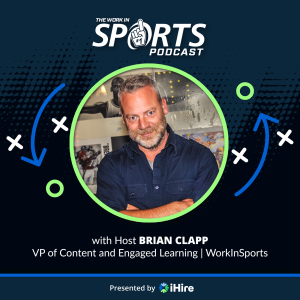
Moving Forward Part 4: Breaking Down Barriers to Entry – Work In Sports podcast
 2020-10-28
2020-10-28
Download
Right click and do "save link as"
June 2014, just 6 years ago, the Atlanta Hawks finished their season 38-44 and were bounced in the first round of the playoffs.
Their General Manager, former NBA player Danny Ferry, was in a conference call with team owners and organizational stakeholders outlining his off-season plans and possible targets in free agency.
Luol Deng, was a free agent.
Ferry, during the call, described Deng as a player who “has a little African in him” and “a guy who would have a nice store out front, and sell you counterfeit stuff out of the back.”
The comments became public after being leaked. Ferry claimed he was only reading comments from a scouting report compiled by someone else. The team concluded from their own commissioned investigation that Ferry’s remarks did not include offensive language, and were not “motivated by racial or ethnic animus.”
You can judge that for yourself, with or without a commissioned investigation.
But that wasn’t the end of the Hawks problems.
At the same time, the franchise’s controlling owner Bruce Levenson reported that he sent out a racist e-mail two months earlier criticizing the Hawks predominantly African-American fan base. The e-mail sent to Ferry detailed Levenson’s belief that the Hawks’ fan base was “overwhelmingly black” and the “black people scared away whites” from attending games.
Levenson also wrote that the Hawks games were attended by a 70 percent black crowd with predominantly black cheerleaders, hip-hop music, 90 percent black patrons at the arena’s bars, and fewer fathers and sons at the games. He added that concerts at the games were mostly hip-hop or gospel, thus attracting more African-American fans.
Levenson sold his interest in the Hawks upon revealing his e-mail to the NBA.
October 7th, 2014, just a few months later, Hawks CEO Steve Koonin, seeing a need for change in his organization, posts a job listing for a chief diversity and inclusion officer.
We so often think roles in diversity and inclusion are the norm in sports. That there are people and staff dedicated to the process of equality in workplace, culture, hiring practices, benefits, deeper cultural awareness, education, and sensitivity – and they have always been there guiding the ship of cultural equity.
But when Steve Koonin and the Atlanta Hawks hired Nzinga Shaw to be their Chief Diversity and Inclusion officer in the fall of 2014, she was the first in the NBA.
Amazingly, when Zing Shaw left the Hawks in 2019 to join Starbucks as their Global Chief Inclusion and Diversity Officer, she was also the first to hold that role at Starbucks.
5 years ago, Diversity and Inclusion roles in sports didn’t exist. And while it is important to note that Diversity Officers and D&I executives are now being included in every sports organization's corporate structure, the fact it took this long, and this big of a problem to make it happen, is sad.
The Hawks, in case you were wondering, during Shaw’s reign, turned their image in the Atlanta community around.
They created all-staff service days with six service projects in the city, accumulating 1,000 combined hours of community service. They had a float in the Atlanta Pride Festival, with current and former players and employees riding on the float and throwing 2,000 basketballs to the crowd with pride and Hawks logos on them. They became an organization focused on fairness, equity and inclusion. I won’t list all the actions they have taken to change their image, but suffice it to say, it is meaningful.
This is a great turn-around story. We love stories where characters find a new truth and are reformed and changed – they’ve always been popular in our culture.
But what if this happened at a smaller, lesser profile team or league or sports connected organization?
If a minor league baseball team’s GM talks about a player in the fashion Danny Ferry did, it doesn’t become national news, it doesn’t spark change,
view more
More Episodes
012345678910111213141516171819
Create your
podcast in
minutes
- Full-featured podcast site
- Unlimited storage and bandwidth
- Comprehensive podcast stats
- Distribute to Apple Podcasts, Spotify, and more
- Make money with your podcast
It is Free
- Privacy Policy
- Cookie Policy
- Terms of Use
- Consent Preferences
- Copyright © 2015-2024 Podbean.com






